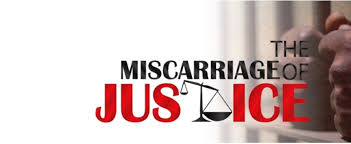

The key points related to unethical behavior and miscarriages of justice are as follows:
Ethical Obligations: People in positions of power, such as law enforcement officers, prosecutors, judges, and other legal professionals, have a fundamental ethical obligation to uphold the principles of fairness, impartiality, and justice. When they engage in unethical behavior, such as fabricating evidence, coercing confessions, or engaging in discriminatory practices, they undermine the integrity of the criminal justice system and can contribute to miscarriages of justice.
Causes of Miscarriages of Justice: Unethical behavior can be a contributing factor to miscarriages of justice, which are wrongful convictions or wrongful outcomes in legal proceedings. Miscarriages of justice can occur due to a variety of factors, including eyewitness misidentification, false confessions, unreliable or fabricated evidence, inadequate legal representation, prosecutorial misconduct, and judicial bias. Unethical behavior, such as tampering with evidence or suppressing exculpatory information, can directly contribute to wrongful convictions.
Impact on Innocent Individuals: Miscarriages of justice have serious consequences for innocent individuals who may be wrongfully convicted and imprisoned for crimes they did not commit. Innocent individuals can suffer physical, emotional, and psychological harm, including loss of freedom, damage to their reputation, loss of employment, strained relationships, and trauma. Unethical behavior that leads to miscarriages of justice can result in profound injustices and irreversible harm to innocent individuals and their families.
Undermining Public Trust: Unethical behavior in the criminal justice system erodes public trust and confidence in the fairness and integrity of the legal system. When individuals perceive that unethical behavior, corruption, or bias are present within the criminal justice system, it can lead to a loss of faith in the system and result in decreased cooperation with law enforcement, increased skepticism towards legal outcomes, and a perception that justice is not served equally.
Need for Ethical Standards and Accountability: It is crucial for legal professionals to adhere to ethical standards and be held accountable for their actions. This includes following established codes of conduct, upholding principles of fairness, impartiality, and justice, and addressing any unethical behavior through appropriate channels, such as internal investigations or disciplinary measures. Additionally, there is a need for external oversight, transparency, and accountability mechanisms to prevent and address unethical behavior and miscarriages of justice within the criminal justice system.
Importance of Education and Training: Education and training on ethics and professionalism are critical for legal professionals to understand their ethical obligations and make informed decisions in the pursuit of justice. Legal professionals should receive comprehensive training on ethical principles, legal ethics, and the potential consequences of unethical behavior. Ongoing education and training can help raise awareness about the importance of ethical conduct and help prevent unethical behavior that can lead to miscarriages of justice.
Need for Reforms: Efforts should be made to implement systemic reforms to address unethical behavior and prevent miscarriages of justice. This may include changes to policies, procedures, and practices within the criminal justice system, such as improved evidence collection and preservation methods, enhanced interrogation techniques, and measures to mitigate bias and discrimination. Additionally, there should be mechanisms in place to report and investigate allegations of unethical behavior, and appropriate consequences for those who engage in such behavior.
In summary, unethical behavior within the criminal justice system can have serious consequences, including contributing to miscarriages of justice. Upholding ethical standards, promoting transparency and accountability, and implementing systemic reforms are crucial to prevent unethical behavior and protect the integrity of the criminal justice system, ensuring that justice is served fairly and equitably for all individuals involved.
1 Inside Justice: Investigating Miscarriages of Justice
3 nov. 2020
2 Forensic Sciences and Miscarriages of Justice – Part 1 of (5)
18 aug. 2010
Miscarriages of justice have been linked to Police Forensic laboratories. unethical people can often claim scientific matches in a book of evidence that one might later discover to be untrue.
This indepth series is one of the more compelling and exciting look into criminal forensics. The ground breaking research that was conducted includes commentary from Witness Experts and the FBI that help uncover the myths about forensic science.
Miscarriage of Justice cases: Cameron Tom William and Michael Behn with commentary from the people who cracked these cases: Fire Investigator John Lentini and FBI Forensic Metallurgist William Tobin; and Sociology Professor Jacqueline Behn; and commentary from Barry Scheck Director innocent Project
Further commenatry from Nancy Gertner US District Judge and Wayne Niemeyer GSR Analyst; and … Ronald Singer Crime Lab director and; Stephen Hill ATF Fire Reseacher and Stephen Avato ATF Fire Investigator .
Information about miscarriages of justice:
A miscarriage of justice primarily is the conviction and punishment of a person for a crime they did not commit. The term travesty of justice is sometimes used for a gross, deliberate miscarriage of justice. Miscarriage of justice” is sometimes synonymous with wrongful conviction, referring to a conviction reached in an unfair or disputed trial.
Causes of miscarriages of justice include:
Plea bargains that offer incentives for the innocent to plead guilty
Confirmation bias on the part of investigators
Withholding or destruction of evidence by police or prosecution
fabrication of evidence or outright perjury by police (see testilying), or prosecution witnesses (e.g. Dr Charles Smith)
Biased editing of evidence
Prejudice towards the class of people to which the defendant belongs
Poor identification by witnesses and/or victims
Overestimation/underestimation of the evidential value of expert testimony
Contaminated evidence
Faulty forensic tests
false confessions due to police pressure or psychological weakness
Misdirection of a jury by a judge during trial
perjured evidence by the real guilty party or their accomplices (frameup)
Perjured evidence by supposed victim or their accomplices
Conspiracy between court of appeal judges and prosecutors to uphold conviction of innocent
3 Forensic Sciences and Miscarriages of Justice – Part 2 of (5)
18 aug. 2010
4 Forensic Sciences and Miscarriages of Justice – Part 3 of (5)
18 aug. 2010
5 Forensic Sciences and Miscarriages of Justice – Part 4 of (5)
18 aug. 2010
6 Forensic Sciences and Miscarriages of Justice – Part 5 of (5)
18 aug. 2010
Miscarriages of justice have been linked to Police Forensic laboratories. unethical people can often claim scientific matches in a book of evidence that one might later discover to be untrue.
This indepth series is one of the more compelling and exciting look into criminal forensics. The ground breaking research that was conducted includes commentary from Witness Experts and the FBI that help uncover the myths about forensic science.
Miscarriage of Justice cases: Cameron Tom William and Michael Behn with commentary from the people who cracked these cases: Fire Investigator John Lentini and FBI Forensic Metallurgist William Tobin; and Sociology Professor Jacqueline Behn; and commentary from Barry Scheck Director innocent Project
Further commenatry from Nancy Gertner US District Judge and Wayne Niemeyer GSR Analyst; and … Ronald Singer Crime Lab director and; Stephen Hill ATF Fire Reseacher and Stephen Avato ATF Fire Investigator .
6 A system on its knees? Inside the criminal justice system with the Secret Barrister
16 jul. 2020
7 Perfect Smurf Tan Prank
24 feb. 2011